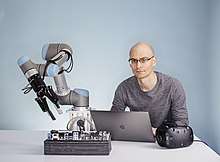Pieter Abbeel
Pieter Abbeel is a professor of electrical engineering and computer science,[1] Director of the Berkeley Robot Learning Lab,[2] and co-director of the Berkeley AI Research (BAIR)[3] Lab at the University of California, Berkeley. He is also the co-founder of covariant.ai,[4][5][6][7][8] a venture-funded start-up that aims to teach robots new, complex skills, and co-founder of Gradescope,[9] an online grading system that has been implemented in over 500 universities nationwide. He is best known for his cutting-edge research in robotics and machine learning, particularly in deep reinforcement learning.
Pieter Abbeel | |
|---|---|
 | |
| Born | Antwerp, Belgium |
| Alma mater | Stanford University (PhD) KU Leuven (MS) |
| Scientific career | |
| Fields | Artificial intelligence, machine learning, deep reinforcement learning, robotics, unsupervised learning |
| Institutions | University of California, Berkeley
Gradescope Covariant.AI |
| Doctoral advisor | Andrew Ng |
Early Life and Education
Abbeel was born in Antwerp, Belgium in 1977. He grew up in nearby suburb Brasschaat.
As a high school student at Sint-Michielscollege (Brasschaat), Abbeel played on the club basketball team. He went on to play on the basketball team of KU Leuven University, where he obtained a Bachelor of Science and Master of Science in electrical engineering in 2000.
Abbeel received his Ph.D. in computer science from Stanford University. He specialized in artificial intelligence research, noting that his interest in AI sparked from the realization that AI can help build tools for other disciplines and that intelligence sets humans apart from other species.[10] Originally, Abbeel intended to pursue a master's degree in computer science, but decided to stay for his Ph.D. due to the abundance of AI projects happening at Stanford. He was the first PhD student of AI Professor Andrew Ng, who was a first-year professor at Stanford at the time. After finishing his Ph.D. in 2008, Abbeel became an assistant professor in Berkeley's electrical engineering and computer science department.
Career
Upon his arrival at UC Berkeley as an assistant professor, Abbeel founded the Berkeley Robot Learning Lab. Additionally, in 2014, he co-founded Gradescope with other UC Berkeley-affiliated engineers Arjun Singh, Sergey Karayev, Ibrahim Awwal,[11] which was acquired by TurnItIn in 2018.[12] In 2016, Abbeel joined OpenAI, where he has published numerous articles on reinforcement learning, robot learning, and unsupervised learning. Also in 2016, he became co-director of the Berkeley Artificial Intelligence Research (BAIR) Lab, which consists of post-doctoral, graduate, and undergraduate students interested in machine learning and robotics. He also founded Berkeley Open Arms,[13] which has licenses the IP on the Blue Robot[14] project from Berkeley. In 2017, he became a full-time professor with tenure at UC Berkeley.
In October 2017, Abbeel and three of his students, Peter Chen, Rocky Duan, and Tianhao Zhang, co-founded covariant.ai (formerly named Embodied Intelligence). The launch of this venture-funded company based in Emeryville, California was covered in, among others, New York Times,[15] Wired,[16] MIT Technology Review,[17] IEEE Spectrum.[18] To date, covariant.ai is still in stealth mode, but their website discloses that they draw on recent advances in deep imitation learning and deep reinforcement learning to develop AI software that makes it easy to teach robots new, complex skills. Currently, in addition to his research, Abbeel teaches upper-division and graduate classes on Artificial Intelligence, Robotics, and Deep Unsupervised Learning.[19]
References
- "UC Berkeley Electrical Engineering and Computer Science".
- "UC Berkeley Robot Learning Lab".
- "Berkeley Artificial Intelligence Research (BAIR) Lab".
- Ackerman, Evan (November 8, 2017). "AI Startup Embodied Intelligence Wants Robots to Learn From Humans in Virtual Reality". IEEE Spectrum.
- Knight, Will (November 7, 2017). "These AI Hotshots Plan to Reboot Manufacturing by Jumping Inside Robots". MIT Technology Review.
- Metz, Cade (November 6, 2017). "A.I. Researchers Leave Elon Musk Lab to Begin Robotics Start-Up". The New York Times.
- Simon, Matt (November 7, 2017). "Want to Really Teach a Robot? Command It With VR". WIRED.
- "Covariant.AI".
- "Gradescope".
- "Pieter Abbeel: "Robotica zal nog sterk evolueren"". Gondola Magazine. June 21, 2019.
- "Gradescope".
- "Turn It In".
- "Berkeley Open Arms".
- Manke, Kara (April 9, 2019). "Meet Blue, the low-cost, human-friendly robot designed for AI". Berkeley News.
- Metz, Cade (November 6, 2017). "A.I. Researchers Leave Elon Musk Lab to Begin Robotics Start-Up". The New York Times.
- Simon, Matt (November 7, 2017). "Want to Really Teach a Robot Command It With VR". WIRED.
- Knight, Will (November 7, 2017). "These AI Hotshots Plan to Reboot Manufacturing by Jumping Inside Robots". MIT Technology Review.
- Ackerman, Evan (November 8, 2017). "AI Startup Embodied Intelligence Wants Robots to Learn From Humans in Virtual Reality". IEEE Spectrum.
- "Pieter Abbeel's Website".